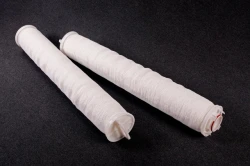How long do industrial water filters last?
2024-03-29
The lifespan of industrial water filters can vary widely depending on several factors, including the type of filter, the quality of the water being treated, the level of contaminants, the flow rate, and the frequency of maintenance. Here are some general guidelines for the lifespan of different types of industrial water filters:
1. Sediment Filters: Sediment filters, which are commonly used to remove suspended particles and debris from water, typically have a lifespan of several months to a year. The lifespan can vary depending on the size and type of sediment being filtered and the frequency of filter cleaning or replacement.
2. Carbon Filters: Carbon filters, including activated carbon and granular activated carbon (GAC) filters, are effective at removing organic compounds, chlorine, and odors from water. The lifespan of carbon filters can range from six months to two years, depending on the level of contaminants in the water and the flow rate.
3. Reverse Osmosis (RO) Membranes: RO membranes are used to remove a wide range of contaminants, including dissolved solids, heavy metals, and bacteria, from water. The lifespan of RO membranes typically ranges from one to three years, depending on factors such as water quality, membrane material, and operating conditions.
4. Ultrafiltration (UF) Membranes: UF membranes are used to remove larger particles, bacteria, and some viruses from water. The lifespan of UF membranes can vary from one to five years, depending on factors such as membrane material, pore size, and operating conditions.
5. Ion Exchange Resins: Ion exchange resins, used for water softening and removal of specific ions such as calcium and magnesium, can have a lifespan of several years with proper regeneration and maintenance. The lifespan of ion exchange resins depends on factors such as resin type, water hardness, and regeneration frequency.
6. UV Disinfection Lamps: UV disinfection lamps are used to kill bacteria, viruses, and other microorganisms in water. The lifespan of UV lamps typically ranges from one to two years, after which they need to be replaced to maintain effective disinfection.
It's essential to monitor the performance of industrial water filters regularly and follow the manufacturer's recommendations for maintenance, cleaning, and replacement intervals. Routine maintenance, such as backwashing, flushing, and membrane cleaning, can help extend the lifespan of water filters and ensure optimal performance. Additionally, water quality testing can help determine when filters need to be replaced or regenerated to maintain water quality standards.



